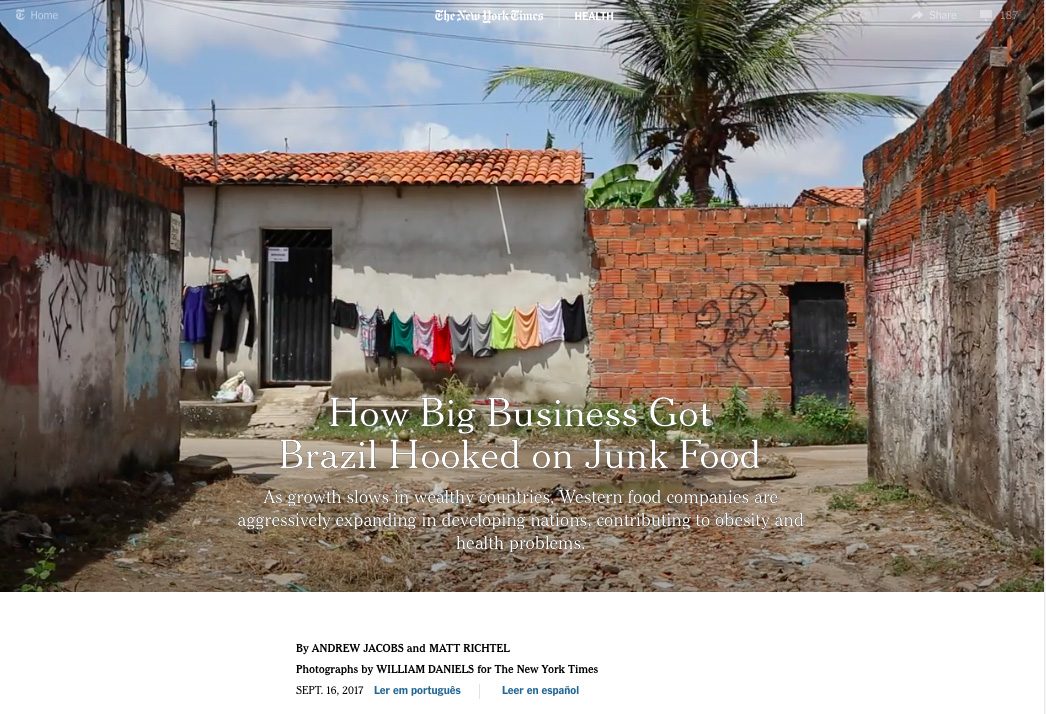How Big Business Got Brazil Hooked on Junk Food
 As growth slows in wealthy countries, Western food companies are aggressively expanding in developing nations, contributing to obesity and health problems.
As growth slows in wealthy countries, Western food companies are aggressively expanding in developing nations, contributing to obesity and health problems.
Big Corporations Like Nestle Are Aggressively Making People Even Fatter Across the Globe
http://www.alternet.org/personal-health/fat-political-issue#.WcJnzOwxFp4.email
_____________________
Beating NCDs can help deliver universal health coverage
Lancet 23 September 2017
Click HERE
Nestlé and the end of the Brabeck Era
By: Franklin Frederick / The Dawn News / April 19, 2017
“The twentieth century has been characterized by three developments of great political importance: the growth of democracy; the growth of corporate power and the growth of corporate propaganda as a means of protecting corporate power against democracy” … more
_____________________
How food companies influence evidence and opinion – straight from the horse’s mouth
______________________
Maharashtra puts on hold its controversial plan to supply malnourished kids with therapeutic foods The state government’s proposal violates national guidelines.
CLICK HERE https://scroll.in/article/850746/maharashtra-puts-on-hold-its-controversial-plan-to-supply-malnourished-kids-with-therapeutic-foods
___________________________________
Can public health reconcile profits and pandemics? An analysis of attitudes to commercial sector engagement in health policy and research. Collin J, Hill SE, Kandlik Eltanani M, Plotnikova E, Ralston R, Smith KE (2017) PLoS ONE 12(9): e0182612. https://doi.org/10.1371/journal.pone.0182612
______________________________
What’s happened to the word ‘independent’?
‘Philip Morris pledges $1bn to stub out tobacco smoking’, Financial Times, Sept 13, 2017.
Andrew Jack https://www.ft.com/content/d9acceae-97d5-11e7-a652-cde3f882dd7b
Derek Yach – ex WHO, ex Senior Vice President, Global Health and Agriculture Policy at PepsiCo – ex-Rockefeller – is now President-Designate of a new Philip Morris Foundation, Foundation for a Smoke-Free World. The Foundation’s website is interesting and shows how the word ‘independent’ has become almost meaningless. Beginning in 2018, the Foundation will receive approximately US$80 million annually over the next 12 years from Philip Morris International (PMI), but claims that PMI and the tobacco industry will apparently have no influence over how the Foundation spends its funds or focuses its activities. Indeed the Foundation claims that independence and transparency are its core principles, that it has an independent research agenda, independent governance, ownership of its data, freedom to publish, and protection against conflict of interest. Furthermore, strict rules of engagement will be put into place to ensure any interactions with the tobacco industry are fully transparent and publicly reported.
For an excellent critique of this Foundation from the WHO Framework Convention on Tobacco Control CLICK HERE http://www.who.int/fctc/mediacentre/statement/secretariat-statement-launch-foundation-for-a-smoke-free-world/en/
___________________
CLICK HERE for a pretty awful article from the British Specialist Nutrition Association (BSNA) – the business front group that represents the UK Baby Food Industry. https://bsna.co.uk/uploads/knowledge-hub/SPR-2017-Nutrition.pdf
_________________
Meanwhile Nestle in August continued to confuse everyone by muscling in on breastfeeding initiatives, such as the annual World Breastfeeding Week – in a clear attempt to divert attention from the harmful marketing that does so much to undermine breastfeeding. Nestlé refuses to take notice of the many World Health Assembly Resolutions that call for safeguards to prevent such on Conflicts of Interest.
Nestlé backs breastfeeding drive in China as government vows to hit 50% target by 2020 By Gary Scattergood+, 02-Aug-2017 Nestlé in China is backing government drives to increase breastfeeding by holding a number of public events to coincide with World Breastfeeding Week.
____________________

